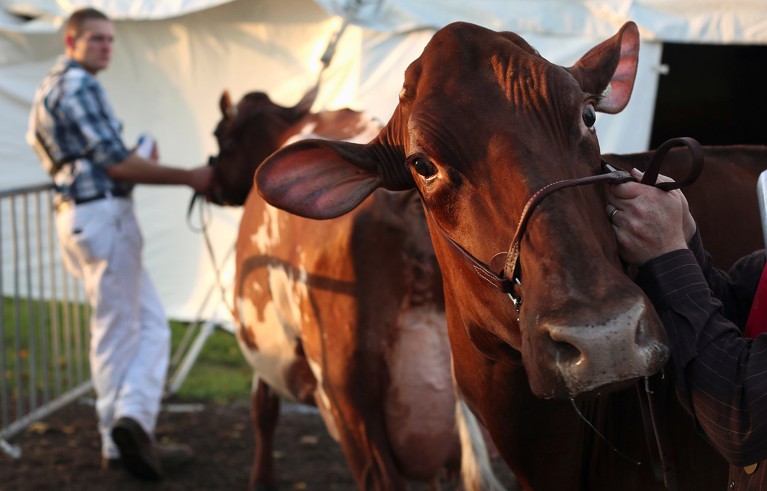Hello Nature readers, would you like to get this Briefing in your inbox free every day? Sign up here.

Dairy cattle seem to survive infection with the H5N1 strain of influenza virus, which has killed millions of wild birds.Credit: Ben Brewer/Reuters
Bird flu in US cows: where will it end?
As the first-known outbreak of H5N1 avian influenza in cows continues in the United States, scientists are increasingly concerned that the animals will become a permanent reservoir for the virus, giving it more chances to mutate and jump to humans. Cows usually survive infection, which could make them a good place for viruses to acquire mutations by swapping genetic material — and there are a lot of cows. One dairy worker in Texas has definitely already been infected with H5N1 (with only mild symptoms) but there could be far more unidentified cases because testing of people is limited.
Major AlphaFold upgrade
A new version of DeepMind’s AlphaFold tool gives scientists the ability to predict protein structures during interactions with other molecules. The tool could be transformative for drug discovery because it can predict the shape of proteins that contain function-altering modifications, or their structure alongside those of DNA, RNA and other cellular players that are crucial to a protein’s duties. “This is just revolutionary,” says biochemist Frank Uhlmann. “It’s going to democratize structural-biology research.” Access to the AlphaFold3 server, however, is limited — partly to protect the advantage of DeepMind’s own drug-discovery spin-off company.
Tighter rules for risky pathogen research
The United States has introduced a new policy that provides stricter oversight of biological experiments that could be misused or spark a pandemic. It took more than four years of deliberations to develop a system that evaluates the risks and benefits of pathogen research without paralysing fundamental science. The policy, which comes into effect next year, sets a standard that might inspire other countries to re-evaluate their current approaches, says biosecurity researcher Filippa Lentzos.
Mexico could have a scientist president
Mexico has two scientist-candidates for president in its elections next month. Leading in the polls is environmental engineer Claudia Sheinbaum Pardo, who has vowed to “make Mexico a scientific and innovation power”. Sheinbaum Pardo would be the first woman and first environmental engineer to lead Mexico. Her rivals include computer engineer Xóchitl Gálvez Ruiz, who criticises Sheinbaum Pardo for not challenging current president Andrés Manuel López Obrador’s policies, including support for Mexico’s oil industry, a controversial science law and cuts to science spending. Some academics echo those concerns: “Is she going to continue López Obrador’s attacks on science or will she … radically change?” asks mathematician Raúl Rojas González.
Features & opinion
Hacking immune system could slow ageing
Rejuvenating the immune system seems to revitalise many organs in an animal’s body — at least in mice. This raises the tantalising prospect of treating immune ageing to control age-related diseases. But interfering with the highly complex immune system can be perilous. Pioneers are setting their sights on low-risk but important goals, such as strengthening older people’s responses to vaccinations and boosting the efficiency of cancer immunotherapies.
The controversy of plant consciousness
In The Light Eaters, journalist Zoë Schlanger takes a deep dive into plant intelligence and consciousness — topics that were long considered pseudoscience. Some cautious studies have popped up, for example of a vine that changes the shape of its leaves to mimic those of neighbouring plants. “As a plant scientist, I am fascinated by what draws us to wanting to define plants as sentient or conscious — or not — through the lens of our limited human understanding of those terms,” writes reviewer Beronda Montgomery.
Dear Nature: my PI yelled at me
In the first of a new Nature Careers advice column, an overworked technician writes to say that their principal investigator (PI) blew up at them after they made a big mistake. Three scientists with experience in negotiating conflict offer their advice.
Do you have a work dilemma you’d like some help with? E-mail naturecareerseditor@nature.com
